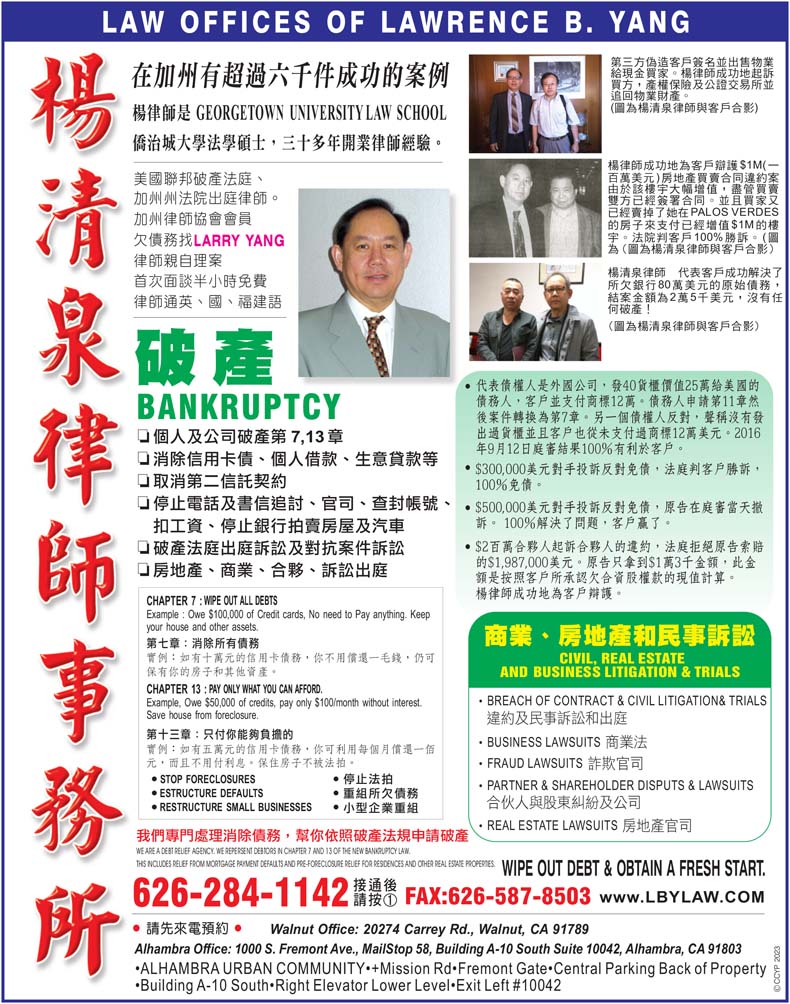EXEMPT PROPERTY VS. PROPERTY NOT PART OF THE BANKRUPTCY ESTATE | YANG, LAWRENCE B., ATTORNEY AT LAW
時間:07/22/2022
瀏覽: 3024
Filing a bankruptcy case creates a “bankruptcy estate”. The estate becomes the legal owner of all of the debtor’s property while the bankruptcy is going on. What does the estate consist of? It consists of all legal or equitable interests of the debtor in property as of the commencement of the case. This includes property owned or held by another person if the debtor has an interest in the property. As a general rule, the creditors of debtor are paid from the non-exempt property of the estate.
For example, you own a house with $600K of equity when you filed for Chapter 7. The “bankruptcy estate” will include your house excluding the $100K equity. So the question is, can you keep your house even as you file for Chapter 7 and even if you have $600K equity in your house? Yes you can keep your house by exempting your equity of $600K.
The trustee is the court appointed administrator of the “bankruptcy estate” of the debtor. His role is to identify, administer and liquidate the debtor’s non-exempt assets with the intent of maximizing the return to the debtor’s unsecured creditors. If all of the debtor’s assets are exempt, or have legitimate liens on them, the trustee will file a “no asset” report with the court, and there will be no distribution of dividends to unsecured creditors. Most Chapter 7 cases of individual debtors are no asset cases.
The trustee accomplishes his or her objective by selling the debtor’s property if it is free and clear of liens, as long as the property is not exempt, or if it is worth more than any security interest or lien attached to the property and any exemption that the debtor holds in the property. Trustee may recover money or property under the trustee’s “avoiding” powers” (not social distancing). These “avoiding powers” include the power to set aside preferential transfers made within a certain time frame. If the transfer is made to a creditor within 90 days pre-filing, the trustee has a strong case to get the money back into the estate. For example, a week before debtor filed for Chapter 7, debtor paid his friend for money that he borrowed from friend last year in the amount of $100K. Can trustee get the $100K back into the estate? Of course, he can. This is a classic example of an avoidable preferential transfer. Trustee will file an adversary case against debtor friend to get the $100K back. The lawsuit is against the friend, not the debtor.
There are also transfers to insiders and related parties that are the favorite of trustees. Normally, trustee can go back four years pre-filing to get these properties back into the estate. For example, debtor quitclaimed a house with $200K of equity to his sister three years before he filed for Chapter 7. Trustee will file an adversary case against sister to get the house back. Does sister have a defense? Yes, she does have a defense to defeat the adversary case. If sister can prove that she paid fair market value for the property at the time that the property was transferred to her, then she can defeat the adversary and she can keep the property. Of course, she will need legal representation to do this because it goes to trial before a Federal Bankruptcy Judge.
In reality though, it takes a lot of money for the trustee to get a property back because the trustee has to hire a lawyer to litigate the adversary case to avoid the preferential or insider transfer. For example, the trustee may be able to sell the property for $500K, but it will take maybe $475K of legal expenses to avoid the transfer. The trustee lawyers get paid, the trustee gets paid his fees, all other professional who helped in the case get paid their fees. All professional fees get paid first from the sale proceeds. Whatever is left is distributed equally to unsecured creditors.
But what if property that is not part of the bankruptcy estate? An asset may be under the name of debtor but debtor merely holds the property in trust for someone else. That asset is not part of the bankruptcy estate because debtor has neither legal nor equitable title to it. For example, debtor’s parents live abroad and they ask debtor to buy them a house in Beverly Hills for $3M. Parents then wire transfer $3M to debtor’s account. That $3M does not belong to debtor and is not part of the bankruptcy estate. Of course, trustee will attempt to get the $3M, but parents will have to hire legal counsel to defeat the claim of the trustee. Parents will win because the $3M belongs to parents, not debtor.
If you need debt relief, set an appointment to see me. I will analyze your case personally. Wear a facemask and gloves for our appointment. I also wear a facemask and gloves and we will be at least 6 feet apart. I know its tough losing your job or having a business with no revenue. Use your credit cards and credit lines to tide yourself through these unusual times. When you need relief from accumulated debt, it’s time to see me.
Disclaimer: None of the foregoing is considered legal opinion and no attorney client relationship is created between reader, any third party and attorney.
“HE IS RISEN!” Mathew 28: 5-6
Lawrence B. Yang is a graduate of Georgetown University with a Master’s Degree in Law and specializes in Bankruptcy, Business, Real Estate and Civil Litigation. He speaks English, Mandarin and Fujian and has successfully represented thousands of clients in California, including companies overseas. Please call Angie, Barbara or Jess at (626) 284-1142 for an appointment at 20274 Carrey Road, Walnut, CA 91789 or1000 S. Fremont Ave., Mailstop 58, Building A-10 South Suite 10042, Alhambra, CA 91803.

图片翻摄自网路,版权归原作者所有。如有侵权请联系我们,我们将及时处理。
 點評
點評 微信
微信 微博
微博






